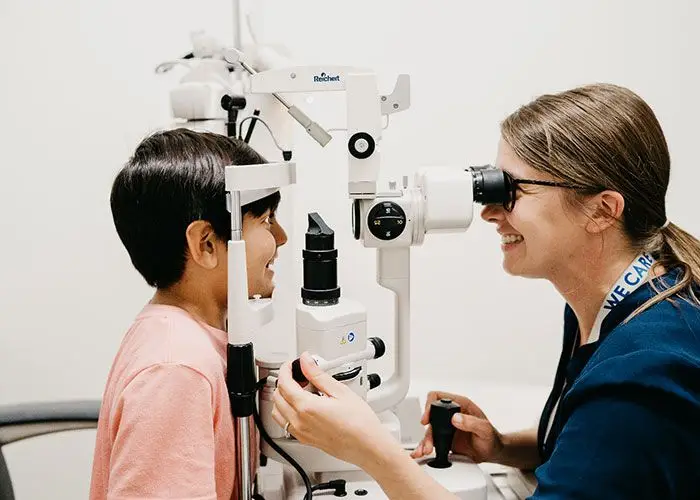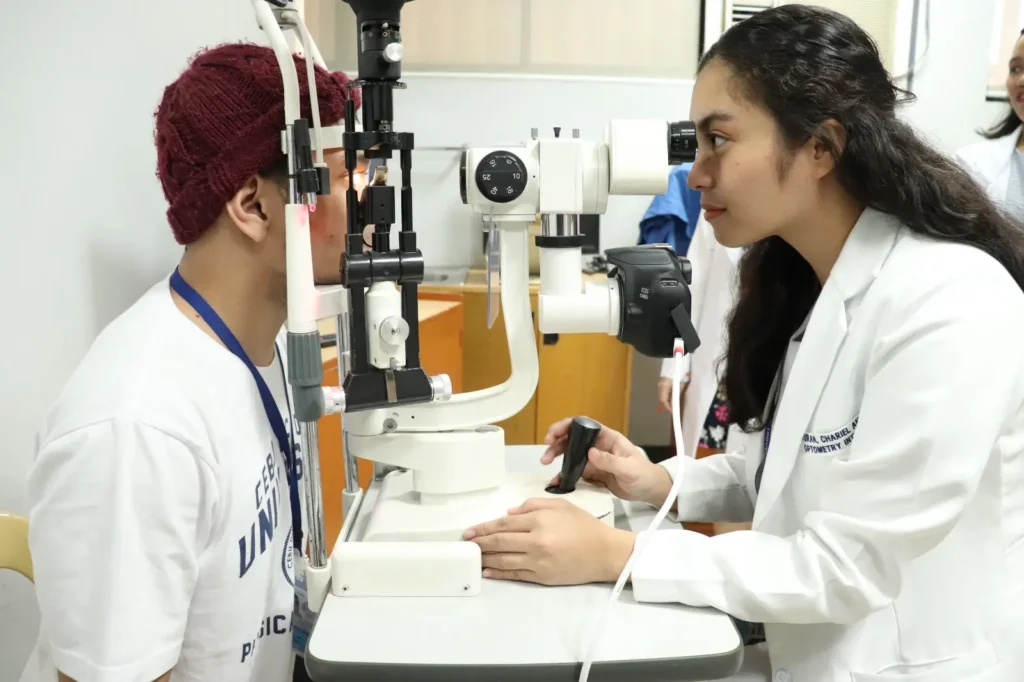A Guide to Diploma in Optometry Colleges in Tamil Nadu
Importance of Optometry in Eye Care
Optometry plays a pivotal role in safeguarding one of our most precious senses: vision. Optometrists are primary eye care providers who specialize in examining, diagnosing, and treating various eye conditions and diseases. Their expertise extends beyond just prescribing glasses or contact lenses; they are trained to detect early signs of eye problems, contributing significantly to the prevention and management of vision-related issues.
Significance of Pursuing a Diploma in Optometry
Pursuing a diploma in optometry opens doors to a fulfilling and rewarding career in the healthcare sector. As a diploma holder, you’ll be equipped with the necessary knowledge and skills to embark on a journey dedicated to improving the vision and overall eye health of individuals. With the increasing demand for eye care professionals, opting for a diploma in optometry sets the stage for a promising career path filled with opportunities for growth and advancement.
Understanding Optometry
Definition and Scope
Optometry encompasses the science of vision and visual systems, focusing on diagnosing and treating visual impairments and eye health issues. Optometrists are trained healthcare professionals who conduct comprehensive eye examinations, prescribe corrective lenses, and provide treatments for various eye conditions such as glaucoma, cataracts, and diabetic retinopathy.
Role of Optometrists in Healthcare
Optometrists play a crucial role in the healthcare system by providing primary eye care services to individuals of all ages. They collaborate with ophthalmologists and other healthcare professionals to ensure comprehensive eye health management, contributing to the overall well-being of patients.
Diploma in Optometry: A Gateway to Success
Overview of Diploma Programs
Diploma programs in optometry offer comprehensive training in various aspects of eye care, including theoretical knowledge and practical skills development. These programs typically cover topics such as ocular anatomy, optics, visual assessment, and clinical procedures.
Key Skills Acquired
Upon completion of a diploma in optometry, graduates acquire a diverse set of skills essential for thriving in the field. These skills include clinical examination techniques, diagnostic proficiency, communication skills for patient interaction, and the ability to interpret and analyze eye health data effectively.
Career Opportunities in Optometry
Diverse Roles for Optometry Graduates
Optometry graduates have access to a wide range of career opportunities across different sectors of the healthcare industry. They can pursue careers as optometrists in private practices, hospitals, clinics, or optometry chains. Additionally, opportunities exist in academia, research, public health, and corporate settings.
Growing Demand in Healthcare Industry
With the increasing prevalence of vision-related disorders and the aging population, there is a growing demand for optometry services worldwide. In Tamil Nadu, specifically, the demand for optometrists is on the rise, driven by the need for accessible and quality eye care services across urban and rural areas.

Specializations in Optometry
Exploring Different Paths
Optometry offers various specialization options that allow graduates to tailor their careers according to their interests and goals. Specializations may include pediatric optometry, geriatric optometry, low vision rehabilitation, contact lenses, and sports vision.
Tailoring Your Career to Your Interests
By choosing a specialization aligned with their interests and passions, optometry graduates can carve out unique career paths and make significant contributions to their chosen field. Specializing also enhances expertise and opens up opportunities for advanced practice and specialization-specific research.
Salary Prospects for Optometry Graduates
Factors Influencing Salary
Several factors influence the salary prospects for optometry graduates, including location, level of experience, specialization, type of practice setting, and demand-supply dynamics in the job market.
Trends in Salary Ranges
In Tamil Nadu, optometry graduates can expect competitive salary ranges commensurate with their qualifications and expertise. The salary ranges may vary across different practice settings, with opportunities for growth and advancement over time.
Top Diploma in Optometry Colleges
Prestigious Institutions in the Field
Tamil Nadu boasts several prestigious optometry colleges renowned for their quality education and comprehensive training programs. Among these, Anna College in Madurai stands out as a leading institution known for its excellence in optometry education.
Factors to Consider When Choosing a College
When selecting an optometry college, aspiring students should consider factors such as accreditation, faculty expertise, infrastructure, clinical training facilities, industry partnerships, placement opportunities, and alumni network strength.
Admission Process and Eligibility Criteria
Step-by-Step Guide to Admission
The admission process for optometry colleges typically involves submitting an application form, appearing for entrance examinations (if applicable), participating in counseling sessions, and meeting the eligibility criteria set by the respective institutions.
Meeting the Requirements
Prospective students must fulfill eligibility criteria related to educational qualifications, minimum age requirements, and any other specific requirements outlined by the optometry colleges. Meeting these requirements ensures a smooth admission process and sets the foundation for a successful academic journey.
Curriculum and Syllabus Overview
Core Subjects Covered
The curriculum of diploma programs in optometry encompasses a wide range of subjects essential for comprehensive eye care practice. Core subjects may include ocular anatomy and physiology, optics, visual optics, clinical optometry, pharmacology, and practice management.
Practical Training Components
In addition to theoretical coursework, optometry diploma programs emphasize practical training to equip students with hands-on experience in conducting eye examinations, performing diagnostic tests, and managing various eye conditions under supervision.

Internship Opportunities
Importance of Hands-On Experience
Internship opportunities play a crucial role in the professional development of optometry students by providing them with real-world exposure to clinical practice settings. Hands-on experience gained during internships enhances clinical skills, decision-making abilities, and confidence levels.
Industry Partnerships and Internship Programs
Optometry colleges often collaborate with hospitals, clinics, eye care centers, and optical establishments to facilitate internship programs for their students. These industry partnerships ensure that students receive quality training and exposure to diverse clinical scenarios.
Alumni Success Stories
Inspiring Journeys of Optometry Graduates
The success stories of optometry alumni serve as testimonials to the quality education and training provided by optometry colleges. Alumni accomplishments showcase the diverse career paths and achievements of graduates, inspiring current students to pursue their career goals with determination.
Networking Opportunities for Current Students
Alumni networks offer valuable networking opportunities for current optometry students, enabling them to connect with industry professionals, seek mentorship, and explore career pathways. Leveraging alumni connections enhances career prospects and fosters a sense of community within the optometry fraternity.
Continuing Education and Professional Development
Importance of Lifelong Learning
Continuing education is integral to the professional growth and development of optometrists, enabling them to stay updated on advancements in the field, expand their knowledge base, and enhance their clinical skills throughout their careers.
Furthering Your Career Through Additional Qualifications
Optometry graduates can pursue postgraduate education, specialty certifications, or advanced training programs to further their career prospects and specialize in specific areas of interest such as pediatric optometry, neuro-optometry, or ocular disease management.
Government Initiatives and Support
Role of Government in Promoting Optometry Education
The government plays a pivotal role in promoting optometry education and supporting initiatives aimed at improving eye care services and infrastructure. Government-backed programs contribute to the expansion of optometry education and the advancement of the profession.
Scholarships and Financial Aid Programs
Government initiatives, such as scholarships and financial aid programs, provide support to deserving students pursuing optometry education. These programs help alleviate financial barriers and make quality education accessible to a wider demographic of aspiring optometrists.
Ethical Considerations in Optometry Practice
Upholding Professional Standards
Optometrists are bound by ethical principles and professional standards governing their practice. Upholding ethical standards ensures patient trust, confidentiality, informed consent, and the delivery of high-quality, patient-centered care.
Ensuring Patient Care and Safety
Ethical considerations in optometry practice extend to ensuring patient safety, promoting evidence-based practice, and maintaining integrity in clinical decision-making. Ethical conduct is essential for fostering positive patient outcomes and preserving the reputation of the optometry profession.
Industry Trends and Innovations
Technological Advancements in Optometry
Technological advancements have revolutionized the field of optometry, enabling more accurate diagnoses, personalized treatment options, and enhanced patient care experiences. Innovations such as digital imaging, telemedicine, and wearable technology are reshaping the landscape of eye care delivery.
Adapting to Changing Healthcare Landscape
Optometrists must stay abreast of industry trends and innovations to adapt to the evolving healthcare landscape effectively. Embracing technological advancements and adopting evidence-based practices are essential for delivering high-quality, patient-centered care in today’s dynamic healthcare environment.
Mentorship and Guidance
Importance of Mentorship for Optometry Students
Mentorship plays a crucial role in the professional development and success of optometry students, providing them with guidance, support, and career advice from experienced practitioners. Mentors serve as role models, offering insights into the nuances of clinical practice and professional growth.
Seeking Support Throughout Your Career Journey
Optometry students and professionals alike can benefit from seeking mentorship and guidance throughout their career journey. Mentorship programs, professional associations, and networking opportunities facilitate mentor-mentee relationships and foster a culture of knowledge sharing and support within the optometry community.

Work-Life Balance in Optometry
Strategies for Maintaining Balance
Maintaining a healthy work-life balance is essential for the well-being and longevity of optometry professionals. Strategies such as time management, boundary setting, self-care practices, and seeking support from colleagues and mentors contribute to achieving balance in work and personal life.
Prioritizing Self-Care in a Demanding Field
Optometry professionals must prioritize self-care to prevent burnout and sustain long-term career satisfaction. Engaging in activities that promote physical, mental, and emotional well-being, such as exercise, hobbies, mindfulness practices, and seeking professional support when needed, is crucial for maintaining overall wellness.
Conclusion
Summary of Career Prospects in Optometry
Completing a diploma in optometry opens doors to a multitude of career opportunities in the dynamic and growing field of eye care. With a strong foundation in optometric principles, clinical skills, and ethical conduct, graduates are well-equipped to make meaningful contributions to the health and well-being of individuals in their communities.
Encouragement for Aspiring Optometrists to Pursue Their Dreams
For aspiring optometrists, embarking on the journey towards a career in optometry is both exciting and fulfilling. By choosing to pursue a diploma in optometry and committing to lifelong learning and professional growth, individuals can embark on a rewarding career path dedicated to improving vision and enhancing quality of life.
FAQs (Frequently Asked Questions)
1. What are the career options after completing a diploma in optometry?
After completing a diploma in optometry, graduates can pursue diverse career options, including practicing as optometrists in private clinics, hospitals, or optometry chains, pursuing further education for specialization, engaging in research, teaching, or working in the corporate sector.
2. How much can I expect to earn as an optometry graduate?
Salary prospects for optometry graduates vary based on factors such as location, level of experience, specialization, and type of practice setting. In Tamil Nadu, optometry graduates can expect competitive salary ranges commensurate with their qualifications and expertise.
3. What factors should I consider when choosing an optometry college?
When choosing an optometry college, aspiring students should consider factors such as accreditation, faculty expertise, infrastructure, clinical training facilities, industry partnerships, placement opportunities, and alumni network strength.
4. Can I specialize in a specific area of optometry after completing my diploma?
Yes, after completing a diploma in optometry, graduates can pursue specialization in specific areas such as pediatric optometry, geriatric optometry, low vision rehabilitation, contact lenses, sports vision, or ocular disease management through further education and training programs.
5. Are there opportunities for international placements in optometry?
Yes, optometry graduates may explore international placement opportunities through exchange programs, international conferences, research collaborations, or employment opportunities abroad. Networking, seeking guidance from mentors, and staying updated on global trends can help graduates navigate international career prospects effectively.
6. What are the admission requirements for optometry colleges in Tamil Nadu?
Admission requirements for optometry colleges in Tamil Nadu typically include educational qualifications, minimum age requirements, and meeting any specific criteria outlined by the colleges. The admission process may also involve entrance examinations and counseling sessions.
7. How long does it take to complete a diploma in optometry in Tamil Nadu?
The duration of a diploma in optometry program in Tamil Nadu is typically three years. However, this may vary depending on the specific curriculum and program structure of the college.
8. What is the scope of optometry practice in Tamil Nadu?
Optometry practice in Tamil Nadu offers a wide scope of opportunities due to the increasing demand for eye care services across urban and rural areas. Optometrists play a crucial role in providing primary eye care services, diagnosing and managing various eye conditions, and promoting eye health awareness.
9. Are there any government initiatives or scholarships available for optometry students in Tamil Nadu?
Yes, the government of Tamil Nadu may offer initiatives or scholarships to support optometry students pursuing education in the state. These programs aim to promote optometry education and make quality education accessible to deserving students.
10. What are the industry trends and innovations shaping the field of optometry in Tamil Nadu?
A: Technological advancements, such as digital imaging, telemedicine, and wearable technology, are revolutionizing the field of optometry in Tamil Nadu. Optometrists must stay updated on these trends and innovations to adapt to the evolving healthcare landscape effectively.




